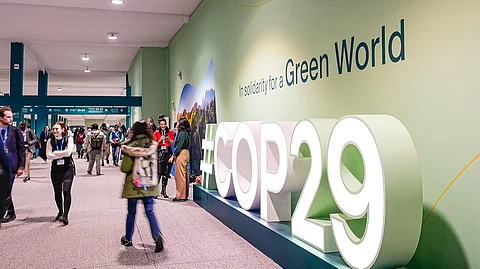

The 29th Conference of Parties (COP 29) to the United Nations Framework Convention on Climate Change (UNFCCC) concluded in Baku, Azerbaijan, on November 24, leaving behind a trail of disappointment on its central agenda — climate finance. Delhi-based think tank Centre for Science and Environment (CSE) has described the conference as a “lost opportunity,” with diluted obligations and shirked responsibilities from developed nations.
Speaking at a webinar titled Did the Finance COP Deliver? hosted by CSE on November 28, 2024, director general Sunita Narain, said, “At COP 29, we lost an opportunity — without a meaningful agreement on climate finance; both in terms of quantity and quality, large parts of the world that would have had the chance to reinvent growth to make it low-carbon intensive, will not be able to do so.”
What’s worse, this comes at a time when these countries are even more vulnerable due to climate change impacts, Narain pointed out.
The COP29 presidency announced a deal to mobilise $300 billion annually by 2035 for developing countries, with a broader $1.3 trillion annual target involving contributions from “all actors,” including private entities and voluntary contributions from developing nations.
The deal falls woefully short of the needs and expectations of the Global South, according to Avantika Goswami, CSE’s climate change programme manager. “The Global North has abandoned the Global South with this meagre offer. It has no right to demand mitigation ambition from our part of the world with so little finance on the table,” she stated.
The G77 and China bloc had sought $600 billion annually in public finance from developed nations out of a larger $1.3 trillion yearly goal, achievable by 2030. The $300 billion target not only falls far short but is also spread over a decade, which CSE researchers say leaves developing nations “stuck with highly inadequate finance” in a critical decade for climate action.
The lack of clarity on whether the $300 billion would be grants-based or concessional raises concerns about the possibility of worsening debt burdens in the Global South. Moreover, the decision text’s framing of the broader $1.3 trillion as a goal from “all actors” transfers much of the burden to the private sector, which has historically contributed only a fraction of the needed finance.
“The ambiguities of the goal make it clear that there will be little accountability and traceability of funds,” Goswami said. “This was the last remaining window for the Global North to step up, pay its fair share, and restore some semblance of trust in the multilateral process. They have failed.”
One of the few bright spots at COP 29 was the adoption of Article 6 of the Paris Agreement, which establishes frameworks for voluntary carbon markets. While the Supervisory Body overseeing Article 6.4 is tasked with ensuring high standards, concerns remain over the potential flooding of markets with low-quality credits from the Kyoto Protocol’s Clean Development Mechanism.
Trishant Dev, CSE’s programme officer for Climate Change, highlighted shortcomings in the framework for Article 6.2, saying it is “weak on accountability” and lacks strong enforcement mechanisms for non-compliance.
Progress on other critical issues, including the Global Stocktake, mitigation targets, and adaptation financing, remained limited. Developing blocs, such as the African Group, had hoped for a separate adaptation sub-goal under the New Collective Quantified Goal (NCQG), which did not materialise.
The issue of unilateral trade measures, including the EU’s carbon border adjustment mechanism (CBAM), was strongly raised by the BASIC group but did not make the formal agenda of the climate summit. Behind closed doors, the G77 and China bloc protested UTMs, with Goswami noting that the issue will likely resurface and urging its inclusion in UNFCCC discussions.
For CSE, COP29 represents a failure of developed nations to meet their climate finance obligations. “So did the finance COP deliver? The answer has to be a most emphatic ‘no’,” Goswami said.